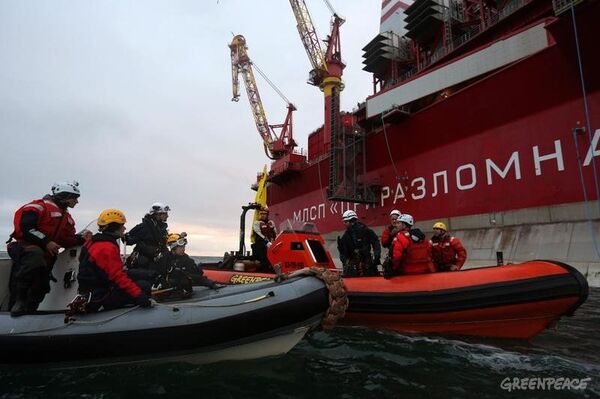MOSCOW, October 22 (Alexey Eremenko, RIA Novosti) – A Russian political activist says he has unearthed court papers showing that an oil platform targeted by a Greenpeace protest is not technically a ship, in effect rendering the ongoing piracy case against an international group of environmentalists inadmissible.
Mikhail Anshakov said on his blog Tuesday that Russia’s Criminal Code defines piracy specifically as an attack on a seagoing or river vessel.
Anshakov, an opposition politician and consumer rights campaigner, said a Moscow court ruling from 2009 revealed that the operator of the Prirazlomnaya platform sought to classify the rig as a “fixed structure” and not a ship to qualify for a tax break.
The ruling, available on the website of the Moscow Arbitration Court, has not previously been mentioned in connection with the Greenpeace case.
Russian authorities seized Greenpeace’s Arctic Sunrise icebreaker in mid-September after activists tried to scale an oil rig in the Arctic in protest against offshore drilling in the area. All 30 people on board – comprising 28 Greenpeace activists and two freelance journalists – were detained and later charged with piracy, which is punishable by up to 15 years in prison.
The Investigative Committee, which is handling the Greenpeace case, did not comment Tuesday on Anshakov’s findings.
The Prirazlomnaya rig is officially designated a “stationary platform” by its operator Gazprom Neft Shelf, a subsidiary of the state-run energy giant Gazprom.
It is installed on the seabed in an area around 20 meters deep, Gazprom Neft Shelf chief executive Gennady Lyubin told RIA Novosti’s Prime financial news agency last month.
A court in the northern city of Murmansk has turned down all bail appeals so far from the group that Greenpeace has dubbed the “Arctic 30.”
An appeal by British ship mechanic Iain Rogers for release from custody was rejected Tuesday.
Detainees have previously complained about poor detention conditions. A lawyer for Finnish activist Sini Saarela has said that prison officials have failed to cater to Saarela’s vegan needs, leaving her to starve.
The Federal Prison Service dismissed those concerns Tuesday in a statement to RIA Novosti, saying that Saarela is given boiled and fresh vegetables three times daily.
Saarela’s lawyer could not be reached for comment. Greenpeace said it was unaware of the specific issues surrounding Saarela's dietary requirements.


